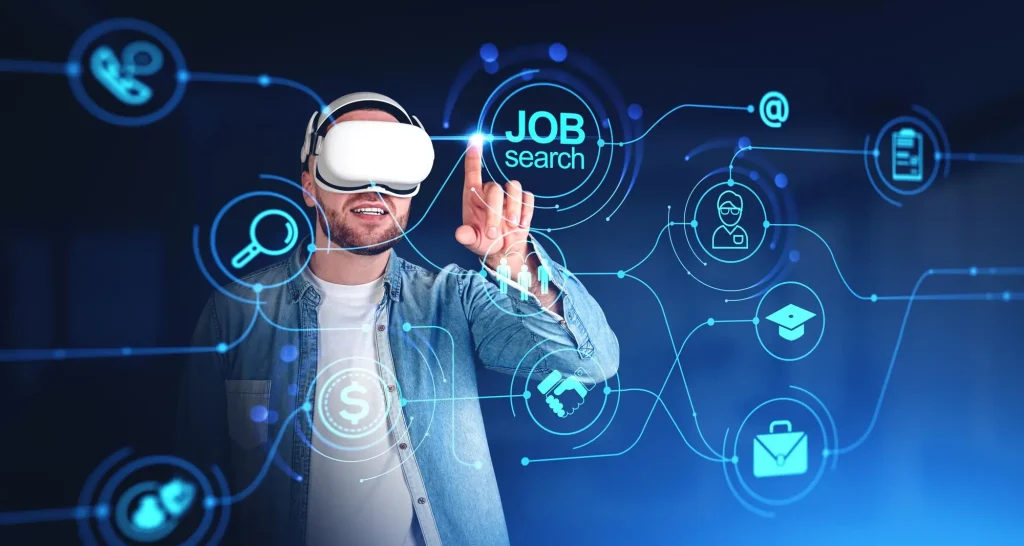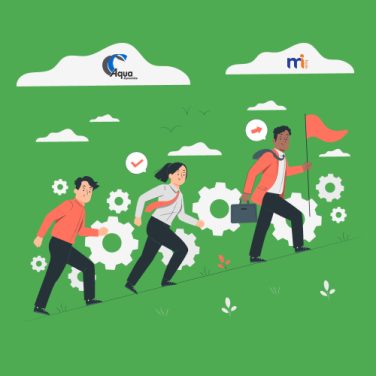The rapid advancement of technology has significantly impacted numerous sectors, with HR and talent acquisition being no exception.
In today’s fiercely competitive job markets, HR departments are turning to AI-enabled recruiting in a bid to secure top talent efficiently and effectively.
AI’s growing influence in HR is reshaping recruitment strategies, streamlining workflows, and offering innovative solutions that enhance hiring processes.
Why AI matters in recruitment

AI tools in talent acquisition enable HR teams to focus more on strategic initiatives rather than mundane tasks.
By automating routine processes like candidate screening and onboarding, AI enhances recruitment speed and efficiency. This transformation allows HR professionals to engage candidates in more meaningful ways, improving overall candidate experience which is crucial in attracting high-quality talent.
Moreover, AI in talent acquisition is not just about speed and efficiency. It also involves using advanced capabilities like predictive analytics, which provide insights into candidate-job fit. These analytics are instrumental in predicting workforce performance and reducing turnover rates, resulting in a more resilient organisation.
For example, products such as MiHCM’s suite, which includes MiHCM Lite and MiHCM Enterprise, offer robust AI capabilities. These tools assist HR departments by providing strategic workforce insights, enhancing recruitment processes, and ultimately improving overall HR efficiency, as organisations strive to outcompete their rivals in attracting exceptional talent.
Evolving landscape of talent acquisition
The landscape of talent acquisition is swiftly evolving, with AI in talent acquisition significantly influencing recruitment strategies.
A key trend is the automation of candidate screening processes, where AI-powered tools streamline the evaluation of vast pools of applicants, enabling HR teams to focus on strategic decision-making rather than time-consuming manual tasks.
These tools assess resumes and other applicant data swiftly, aligned with job requirements, allowing recruiters to identify potential candidates faster and with greater accuracy.
Predictive analytics represent another transformative trend, offering remarkable benefits in enhancing candidate-job matching. By leveraging data from previous hires and job performance metrics, AI systems predict which candidates are likely to succeed in specific roles.
This insight helps HR departments make informed selection decisions, positively impacting employee retention and overall workforce performance. For instance, predictive analytics integrated with tools like MiHCM products ensures that hiring decisions are not just faster but also more strategically sound.
AI’s integration extends into onboarding processes, contributing to a seamless recruitment experience by tailoring onboarding programmes to the needs of individual hires.
This personalised touch, although automated, ensures that new hires are aligned with organisational cultures and practices from the start. The result is a smoother transition and faster adaptation period, enhancing new employees’ productivity and engagement.
- Automation of candidate screening: AI-powered tools efficiently handle large applicant pools.
- Predictive analytics for hiring: Improves match quality and workforce performance predictions.
- AI in onboarding: Personalises new hire experiences, ensuring smooth transitions.
Embracing these emerging trends not only accelerates the entire recruitment process but also enhances its efficiency significantly.
Products like MiHCM Lite and MiHCM Enterprise leverage these capabilities to offer efficient recruitment solutions, allowing HR departments to maintain a competitive edge in the race for talent. Such solutions streamline hiring processes, making them more responsive and effective, ultimately leading to improved recruitment efficiency and enriched candidate experiences.
By embracing these technologies, HR departments can transform their recruitment landscape, ensuring a seamless blend of AI efficiencies and the human touch essential in talent acquisition.
Building ethical AI strategies
One critical consideration is the ethical use of AI, a pressing concern where biases must be diligently managed.
Transparency and accountability are key; HR departments should implement ongoing assessments of AI tools to identify and rectify any biases that may arise. Creating a diverse dataset for training AI systems can significantly help in mitigating preconceived biases, ensuring a fair and inclusive recruitment process.
Another important aspect is the integration of AI without diminishing the human element essential in recruitment.
Candidates still seek personal interactions, and balancing AI efficiencies with empathetic engagement is crucial for a successful recruitment strategy. For instance, chatbots can handle initial stages of interaction, scheduling, and basic queries, saving time and allowing HR professionals to focus on more complex, nuanced candidate interactions.
HR departments should also be proactive about upskilling their teams, ensuring they are adept at using AI tools and interpreting data insights. This cultural shift will enable HR professionals to better leverage AI capabilities, fostering data-driven decision-making.
- Establishing transparent AI systems: Regularly evaluate algorithms for bias.
- Balancing AI and human interaction: Maintain personal touches in candidate dealings.
- Employee training: Ensure HR teams are equipped to use AI tools effectively.
With the help of solutions like MiHCM’s suite, which offers powerful AI functionalities tailored for HR efficiency, companies can align these strategies with their operational goals.
By prioritising ethical and balanced AI adoption, HR departments can markedly improve recruitment efficiency and candidate satisfaction, staying competitive in a fast-evolving job market.
AI adoption obstacles in talent acquisition
| Challenges | Solutions |
|---|---|
| Bias in algorithms | Regular audits and diverse dataset training |
| Privacy concerns | Ensuring transparent data handling and adherence to legal standards |
| Resistance to change | Invest in HR training and upskilling |
Looking to the future
Looking to the future, AI’s capabilities in HR are poised for further evolution.
Advanced language models and cognitive technologies are opening new doors for candidate assessments, including sentiment analysis and cultural fit evaluations. These advancements promise not only to enhance recruitment strategies but to transform the candidate experience.
Furthermore, as AI technology continues to evolve, we can expect more immersive recruitment experiences, such as virtual reality interviews, which can offer insights into candidates beyond the capabilities of traditional methods. As these technologies become mainstream, businesses will need to adapt continually to leverage AI strategically in their pursuit of top talent.
AI in talent acquisition is rapidly gaining traction as an indispensable tool for HR departments striving to identify and onboard top talent efficiently. Several organisations have embraced AI-driven recruiting solutions, resulting in significant enhancements in recruitment metrics, candidate experiences, and overall HR efficiencies.
- Google’s AI for resume screening: Google utilises AI to streamline its massive candidate review processes. Their AI tools can quickly analyse thousands of resumes, identifying qualified candidates that match job criteria within minutes, significantly reducing the time-to-hire for various positions.
- Unilever’s predictive hiring approach: Unilever has successfully integrated AI systems, employing predictive analytics to analyse candidate data, including interview responses and game performance. This process not only enhances job matching accuracy but also increases candidate engagement by offering an interactive application experience.
- Vodafone’s chatbot for candidate interaction: Vodafone adopted an AI-powered recruitment chatbot to manage initial candidate interactions. This tool efficiently handles queries, schedules interviews, and offers immediate feedback, markedly improving the candidate experience by maintaining high levels of engagement from application through onboarding.
These examples illustrate how AI can transform recruitment processes by making them more efficient and data driven.
Businesses utilising AI, like those employing MiHCM’s comprehensive solutions, enjoy the dual benefits of streamlined workflows and insightful HR analytics. This enhances recruitment strategies not only by reducing administrative burdens but by enabling data-powered decisions, leading to more effective hires and agile workforce management.
A transformative change in talent acquisition
As the landscape of HR morphs with technological advancements, embracing AI tools promises a transformative change in talent acquisition and recruitment processes.
AI not only modernises recruitment with precision and efficiency but also offers a pathway to sustain a competitive edge in bustling job markets. By adopting AI responsibly, HR leaders can ensure that their departments benefit from streamlined operations and enhanced candidate experiences without compromising ethical standards.
Encouragingly, AI’s role in shaping the future of HR is both profound and promising. It equips HR teams with strategic insights, enabling better decision-making that impacts workforce performance and employee satisfaction positively.
HR departments are urged to progressively integrate AI tools like MiHCM’s suite, which includes MiHCM Lite and Enterprise products. These solutions deliver powerful AI functionalities that uplift recruitment efficiencies and cultivate a data-driven HR landscape.
The potential of AI in reshaping HR frameworks cannot be overstated. As HR departments leverage AI to automate mundane tasks, professionals are freed to focus on strategic initiatives that drive organisational growth.
AI holds the key to revolutionising HR, and its responsible adoption ushers in an era of unprecedented innovation.



